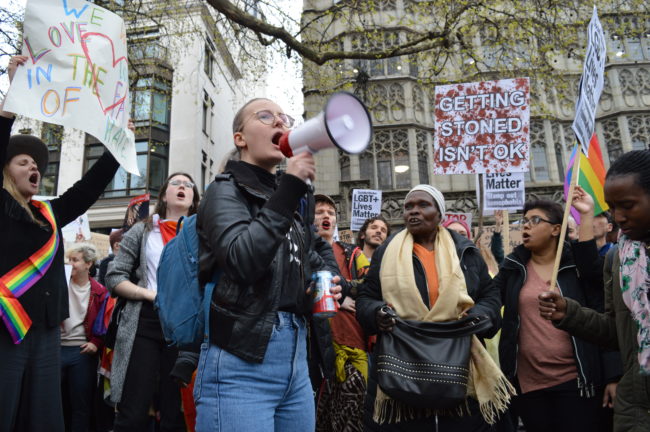TfL bans adverts from countries with gay death penalty

An advert promoting Brunei seen at the TfL station in Vauxhall, London, in March 2019. (NobleGay/Twitter)
Transport for London (TfL) has banned adverts from 11 countries with poor human rights records, including six nations which punish gay sex with the death penalty.
Iran, Nigeria, Saudi Arabia, Somalia, Sudan and Yemen join Brunei in the list of countries suspended from TfL for their anti-gay laws.
Details of the advert review were first reported on May 2 by the Evening Standard.
According to The Standard, the changes took place after Green Party London Assembly member Caroline Russell wrote a letter to Mayor Sadiq Khan with concerns about countries with negative human rights records.
Sadiq Khan: ‘London champions LGBT+ rights’
A spokesperson for Sadiq Khan told PinkNews: “The Mayor is immensely proud that London is a city where you are free to be whoever you want to be and love whoever you want to love.”
“TfL adverts are seen by millions of people every year, and given the global role London plays championing LGBT+ rights, the Mayor has asked that TfL review how it treats advertising and sponsorship from countries with abhorrent anti-LGBT+ laws.”

Campaigners chanted pro-LGBT+ slogans at The Dorchester. (Ella Braidwood)
The ban also includes Pakistan, Qatar, the UAE, Mauritania and Afghanistan which have “possible” death penalties for gay sex, according to the International Lesbian, Gay, Bisexual, Trans and Intersex Association (ILGA).
The ILGA stated in their March 2019 report, “State-Sponsored Homophobia,” that six UN Member States impose the death penalty on consensual same-sex sexual acts (Iran, Nigeria, Saudi Arabia, Somalia, Sudan and Yemen) and in five UN Member States the death penalty is a possible punishment (Afghanistan, Mauritania, Pakistan, Qatar, United Arab Emirates).
Which countries are banned from advertising with TfL?
- Iran
- Nigeria
- Saudi Arabia
- Somalia
- Sudan
- Yemen
- Brunei
- Pakistan
- Qatar
- United Arab Emirates
- Mauritania
- Afghanistan
A TfL spokesperson told PinkNews: “Pending the review, we have asked our advertising partners not to accept any new adverts originating from the countries identified by the International Lesbian, Gay, Bisexual, Trans and Intersex Association (ILGA) as having the death penalty for same-sex acts. This includes advertisements from the states and from state-owned companies.”
Brunei suspended from TfL after introducing gay stoning laws
In early April TfL banned adverts from Brunei after the country introduced laws which can punish gay sex with stoning.
Posters were promoting Brunei as “an abode of peace” across the underground network and were promptly removed after objections from the general public.
Labour London Assembly member Tom Copley was one of many who objected to the campaign for Royal Brunei Airlines, which is owned by the Brunei government. He wrote to the Mayor of London asking for the posters to be removed.
A TfL statement in response to the posters said: “This is an issue of great public sensitivity and controversy so the advert will be removed from our network.
“The advertisement was considered compliant with our advertising policy when it was submitted and accepted.”
A spokesperson for Khan told PinkNews that he “believes the new laws being introduced in Brunei are abhorrent, and is pleased that TfL is taking swift action to remove this advert.”
Brunei is still facing boycotts
TfL’s decision to scrap Brunei adverts comes amid a growing backlash against the anti-LGBT country.
Financial services firm JPMorgan Chase became the latest organisation to ban staff from booking into Brunei-owned hotels on April 29, joining many other companies in boycotting the hotel chain.
While Virgin Australia cancelled an arrangement with Royal Brunei, under which the former’s staff could book discount travel on the latter’s flights.
The airline also has a one-way agreement allowing Brunei customers to book tickets on Virgin Australia flights, which remains in place.
PinkNews also does not accept direct advertising or sponsorship to promote countries where being LGBT+ is illegal.

